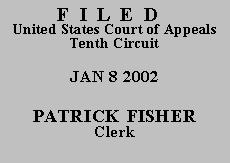

| KEVIN D. CHESTRA,
KEVIN D. CHESTRA, Petitioner - Appellant, v. JAY SHELTON; ATTORNEY GENERAL OF THE STATE OF KANSAS, Respondents - Appellees. |
No. 01-3188 (D.C. No. 00-CV-3466-DES) (D. Kan.) |
ORDER AND JUDGMENT(*)
Mr. Chestra was convicted of two counts of aggravated indecent liberties with a child and one count of criminal threat and was sentenced to serve consecutively 59 and 57 months for the two counts and 7 months for the threat. Doc. 1 at 1-2 (No. 01-3188). His conviction was affirmed on direct appeal. Id. at 4-5. He then sought state post-conviction relief. On December 1, 2000, Mr. Chestra also petitioned the Kansas federal district court for a writ of habeas corpus. Id. On January 17, 2001, Mr. Chestra filed the § 1983 complaint in the Kansas federal district court. Doc. 1 (No. 01-3140). The Kansas Court of Appeals heard Mr. Chestra's motion for state post-conviction relief on March 14, 2001, see Doc. 5 at 1 (No. 01-3188), but had not issued a ruling as of April 18 or April 23 of 2001, when the district court dismissed without prejudice the § 1983 complaint, Doc. 7 (No. 01-3140), and the petition for writ of habeas corpus, respectively, Doc. 3 (No. 01-3188).
As to the § 1983 appeal, we agree with the district court that Mr. Chestra has failed to state a cause of action. The Supreme Court has held that "a prisoner ... has no cause of action under § 1983 unless and until the conviction or sentence is reversed, expunged, invalidated, or impugned by the grant of a writ of habeas corpus." Heck, 512 U.S. at 489. See Parris v. United States, 45 F.3d 383, 384-85 (10th Cir. 1995). Mr. Chestra has made no such showing.
As to the COA, Mr. Chestra's appeal is controlled by § 2254(b) which prohibits the granting of relief unless the petitioner has fully exhausted state court remedies or demonstrated that such remedies are unavailable or ineffective under the circumstances. See also O'Sullivan v. Boerckel, 526 U.S. 838, 842 (1999); Brown v. Shanks, 185 F.3d 1122, 1124 (10th Cir. 1999). Mr. Chestra petitioned the federal district court before the state court of appeals had ruled on his motion for post-conviction relief. He, therefore, failed to fully exhaust his state court remedies and has neither argued nor demonstrated that such remedies are unavailable or ineffective. Mr. Chestra asserts that the district court should have granted his motion to stay the proceedings rather than dismiss without prejudice. We find that the district court did not abuse its discretion in dismissing without prejudice rather than staying the proceedings.
We AFFIRM the district court's order dismissing Mr. Chestra's § 1983 complaint. We also DENY Mr. Chestra's request for a COA and DISMISS his § 2254 appeal.
Entered for the Court
Paul J. Kelly, Jr.
Circuit Judge
*. This order and judgment is not binding precedent, except under the doctrines of law of the case, res judicata, and collateral estoppel. This court generally disfavors the citation of orders and judgments; nevertheless, an order and judgment may be cited under the terms and conditions of 10th Cir. R. 36.3.
2. After examining the briefs and the appellate record, this three-judge panel has determined unanimously that oral argument would not be of material assistance in the determination of this appeal. See Fed. R. App. P. 34(a); 10th Cir. R. 34.1(G). The cause is therefore ordered submitted without oral argument.